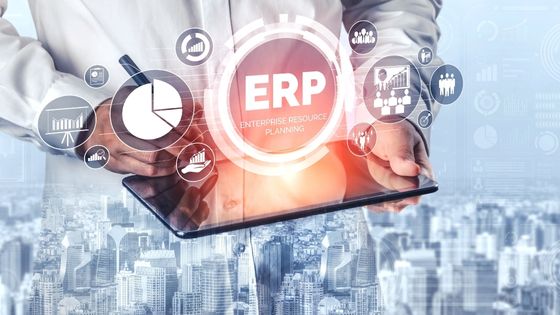Ever considered building your own ERP software to manage your business processes? It’s a smart and strategic move. Whether you own a business or not, there is something for everyone to learn about ERP systems and the advantages of having one installed in their company.
If you’re planning on starting a company, you should do some research into this. In this article, we cover all of the basics that any entrepreneur needs to know when you decide to build an ERP system.
What is an ERP System?
An ERP system is a software solution that helps businesses manage their core operations, including accounting, inventory, production, and customer relationship management. By integrating these disparate systems into a single platform, businesses can improve visibility into their operations, reduce inefficiencies, and gain a competitive edge.
Benefits of an ERP System
An ERP system can bring a number of benefits to your business. Perhaps the most significant benefit is the ability to streamline and automate your business processes. This can lead to increase efficiency and productivity.
An ERP system can also help you gain better visibility into your business operations. With all of your data in one central location, you can more easily identify areas that need improvement. Additionally, an ERP system can help you make better decisions by providing real-time data analytics.
Finally, an ERP system can improve communication and collaboration within your organization. By giving everyone access to the same information, you can avoid silos and ensure that everyone is working towards the same goals.
Different Types of ERP Systems
There are different types of ERP systems for businesses available in the market. You need to select the one that best suits your business needs. Here are some of the most popular and best ERP systems:
- SAP: One of the largest and most popular ERP systems, SAP offers a comprehensive suite of business applications. It is used by large enterprises across various industries.
- Oracle: Another major player in the ERP market, Oracle offers a wide range of enterprise applications. It is suitable for businesses of all sizes.
- Microsoft Dynamics: A Microsoft product, Dynamics is a popular choice for small and medium businesses. It offers a flexible and affordable solution for businesses that want to automate their operations.
- Infor: Infor provides enterprise software solutions for specific industries such as manufacturing, healthcare, and retail. It offers a scalable and customizable solution for businesses of all sizes.
- Epicor: Epicor is another leading provider of enterprise software solutions. It offers a complete suite of business applications for manufacturing, distribution, and service organizations.
- Sage: Sage is an affordable ERP system that is suitable for small and midsize businesses. It offers a range of business applications to help streamline operations and improve efficiency.
Steps to Building an ERP System
- Define your business goals and objectives: Before embarking on the journey of selecting an ERP system, it is important to first define your business goals and objectives. This will help you determine the right ERP system for your business and ensure that the system meets all your business requirements.
- Research different ERP systems: Once you have defined your business goals, you can start researching different ERP systems available in the market. There are a number of factors that you need to consider while choosing an ERP system, such as its features, scalability, price, etc.
- Evaluate the different ERP systems: Once you have shortlisted a few ERP systems, it is time to evaluate them against your business goals and objectives. This will help you zero in on the most suitable ERP system for your business.
- Implement the chosen ERP system: After selecting the right ERP system for your business, it is time to implement it across all departments and processes. This might require some training for employees to get accustomed to the new system but will be worth it in the long run.
The Cost of Developing an ERP System
To build an ERP system can be a significant investment for a business, but the cost of developing and maintaining the system should be considered in light of the benefits it can bring.
The best ERP systems for businesses can be expensive to develop, especially if they are customized to meet the specific needs of a business. The cost of an ERP system can also vary depending on the size and complexity of the system. However, the benefits that an ERP system can bring to a business often outweigh the costs.
A lot of companies don’t realize how much it costs to develop an ERP system. In fact, it can cost anywhere from $5,000 to $20,000 per year in maintenance costs alone! However, this estimate can be higher if you need extensive customization or have a large number of users.
The actual cost depends on several factors:
- The size of your business and its complexity.
- The number of users who will be using the system.
- How much customization you require, if at all
ERP systems provide businesses with real-time data, automate tasks and processes, and streamline supply chains. In addition, an ERP system can help businesses save money by reducing errors and improving efficiency.
Alternatives to Building an ERP System
Building an ERP system from scratch can be a daunting and expensive undertaking. Luckily, there are a number of alternatives that can provide your business with many of the same benefits without all the hassle.
One popular option is to purchase an off-the-shelf ERP package. It can be a good idea to start with a starter package, but make sure it fits your needs.
Another option is to use open-source ERP software. This software is free to download and use, and there is a large community of users who can offer support and advice. However, it can be more difficult to set up and configure than commercial software.
Finally, you could also consider using cloud-based ERP software. This option can be very scalable and flexible, and you pay only for the resources you use. However, it is important to make sure that your data is properly backed up and secured in the cloud.
Conclusion
At the end of the day, ERP is all about making your business more efficient by streamlining your growth. An ERP system can help you set up the processes and procedures required to grow your business and in all this InvoZone helps you.
Building and implementing an ERP system is a worthwhile endeavor that will pay off for both your business and your own career.




















